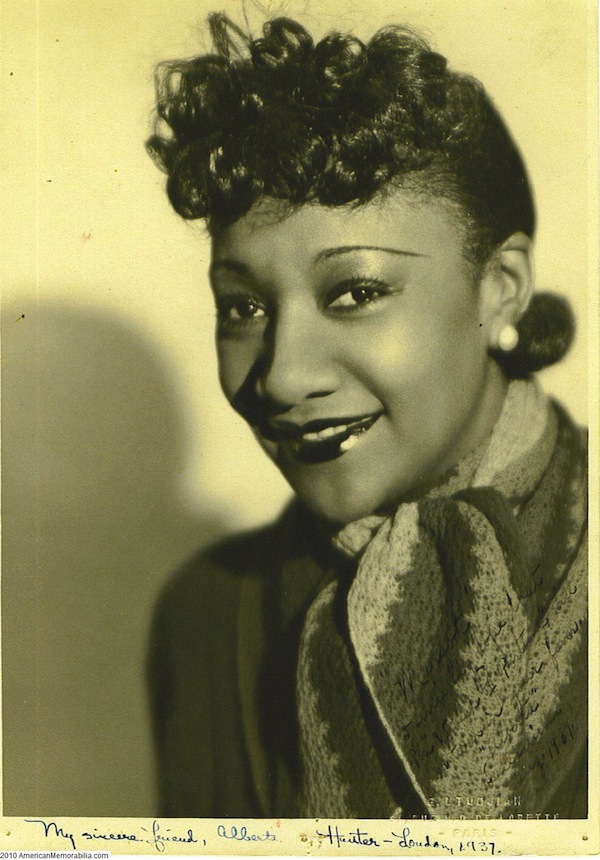At age twelve Alberta Hunter ran away from her hometown of Memphis to go to Chicago to become a Blues singer. She had a somewhat hard time at first but gradually, achieved her goal and became one of the most popular African-American entertainers of the 1920s. She got her professional start in 1911 at a Southside club called Dago Frank’s, a tough bordello frequented by pimps and criminals. She stayed there until 1913, when the place was closed after a murder in the club. She then moved on to a small night club and managed to save enough money to bring her mother north to Chicago and support her for the rest of her life. Alberta was married briefly, but never consummated the union, using the excuse that she didn’t want to have sex in the same house where her mother lived, but the real story was that Hunter was a lesbian. Her husband moved back to the South and she never saw him again. Alberta met Lottie Taylor soon afterwards. She was the niece of the famous African-American entertainer Bert Williams. The two became lovers and stayed together for many years. Alberta moved on to a club called Elite Cafe #1 (3030 South State Street) where New Orleans Ragtime pianist Tony Jackson tickled the keys. Unlike Alberta, Tony Jackson was openly gay, which must have taken a lot of guts back in those days. Alberta helped to popularize some of Jackson’s songs, including his most famous song, “Pretty Baby” which was written for his boyfriend. In 1915 Hunter got a gig at the Panama Cafe, which was a fancy place that catered to Whites. At this point Alberta was becoming a star in Chicago, but the Panama was also closed after a murder and Alberta went next door to The De Luxe Cafe (3503 South State Street), and then across the street to the Dreamland Cafe (3520 South State Street) where King Oliver’s Creole Jazz Band played. During her stay there she became friends with Oliver’s pianist Lil Hardin who was also from Memphis. After this Hunter became a full fledged star and was billed as the “Sweetheart of Dreamland”. After her show at the Dreamland she would take a train to another club and sing some more. One night her piano player was shot and killed while they were on stage. Clearly, gangsterism was out of control in Chicago. In 1921 Alberta moved to New York and launched her recording career with the Black Swan label with Fletcher Henderson’s Novelty Orchestra, but she switched to Paramount in 1922 where Fletcher Henderson continued to accompany her on the piano. Hunter wrote a lot of her own material and her song “Down Hearted Blues”, became Bessie Smith’s first record in 1923. That same year she became the first African-American singer to be backed up by a White band, when the Original Memphis Five supported her on “Tain’t Nobody’s Biz-ness If I Do” and “If You Want To Keep Your Daddy Home”, and “Bleeding Hearted Blues”. In 1924 she sang on the famous Clarence Williams produced Red Onion Jazz Babies sessions that brought Louis Armstrong and Sidney Bechet together for the first time on record. While in New York, Hunter got involved in several African-American musical revues. She replaced Bessie Smith in the “How Come?” revue of 1923, and this established her as a star in New York City. Alberta Hunter recorded under several pseudonyms during the 1920s in an attempt to keep record companies she had signed exclusive contracts with from finding out about this extra source of income. On the Biltmore label she was Alberta Prime; on the Gennett she was Josephine Beatty (the name of her dead half sister); and on the Okeh, Victor and Columbia labels she used her own name. It is said that Alberta’s talents were never captured that well on records, and that she was much better live. She also used the name of May Alix, but there was also a real May Alix that recorded with Jimmie Noone’s Apex Orchestra and Louis Armstrong and his Hot Five. Before leaving for Europe in 1927 she recorded some sessions with Fats Waller on organ. Later that year she performed in England and on the Continent as part of “Showboat” with Paul Robeson, and various other traveling musical revues. She was a hit in Paris, and continued to perform in Europe throughout the 1930s as well as the Middle East and Russia. During World War II, Alberta was part of the USO and entertained the troops throughout Asia, the South Pacific Islands and Europe. After the war she returned to America to care for her ailing mother, but continued singing until she quit music in 1956 after her mother died. At the age of 59 she enrolled in a practical nursing course and for the next twenty years she worked in a New York City hospital. In the early 1960s she recorded a few albums and then surprisingly took to the stage again in 1977 at age 82 and continued to perform up until the time of her death in 1984. from http://www.redhotjazz.com
